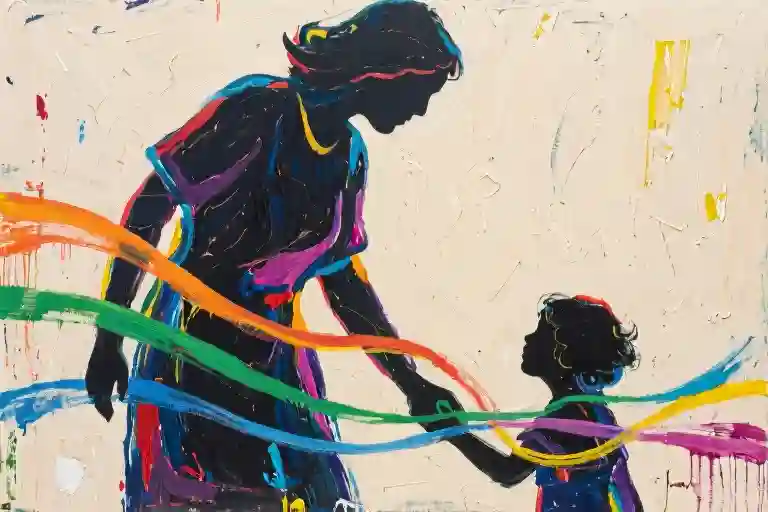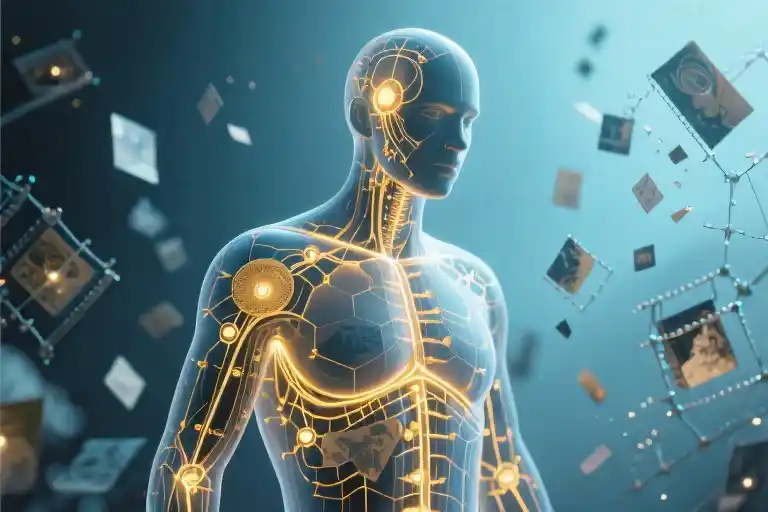I used to believe love was an unsolvable equation – the kind with too many variables that never balanced out no matter how hard I tried. Every attempt to make it work left me bruised, calculating my worth in the currency of compromises and swallowed truths. Love meant sleepless nights deciphering mixed signals, reshaping myself to fit someone else’s expectations, mistaking exhaustion for passion.
Then you entered the picture without fanfare, and something shifted. Not with dramatic declarations, but in the quiet way your presence became as natural as breathing. The heaviness I’d carried for years – that constant anxiety of not being enough – began dissolving without ceremony. For the first time, love wasn’t a problem to solve or a prize to earn. It just was. Persistent and uncomplicated, like the hum of a familiar song playing softly through life’s ordinary moments.
This realization didn’t arrive as an epiphany, but in subtle waves. In how you’d remember to leave the porch light on during my late work nights. The way you’d hand me a sweater before I realized I was cold. These small acts accumulated like gentle corrections to an old, faulty narrative about what love required.
What changed wasn’t just the relationship, but my fundamental understanding of belonging. Where I once saw cracks in myself – the insecurities, the fears, the imperfect edges – you reflected back unexpected beauty. Not through empty compliments, but by treating my vulnerabilities as natural landmarks rather than flaws needing concealment. Your steady presence became proof that love could be both soft and certain, demanding nothing more than my unguarded presence in return.
Perhaps this is love’s most transformative power – not the sweeping gestures we’re taught to expect, but the quiet assurance of being fully seen. Of having someone who recognizes your light even when you can only see your shadows. That’s the paradox you taught me: the right love doesn’t complete you, but makes you more distinctly yourself.
When Love Felt Like a Code to Crack
For years, I carried love like an overloaded backpack – shoulders aching from the weight of unanswered texts, eyes sore from analyzing tone indicators in messages sent at 2:37AM. My relationships operated on an unspoken exchange rate: If I become 20% funnier, maybe they’ll stay. If I lose those 15 pounds, perhaps I’ll be lovable. The arithmetic of affection left permanent pencil marks on my soul.
The Rituals of Uncertainty became second nature:
- Rewriting simple “good morning” messages seven times before sending
- Changing outfit choices based on their Instagram likes
- Practicing laugh pitches in the mirror like an actor auditioning for the role of “The Cool Girl”
A 2022 psychology study pinned numbers to my pain: 68% of adults with anxious attachment believe love requires constant performance reviews. We develop what therapists call conditional love programming – the unconscious belief that affection must be continually earned like frequent flyer miles.
Internal monologues played on loop:
“If I pretend to like camping, he might think I’m adventurous enough”
“Maybe if I never complain, she’ll consider me low-maintenance”
These weren’t relationships – they were emotional escape rooms where I kept solving puzzles only to find new locks. The cruelest twist? The prize for all that deciphering was simply…more decoding.
Then came the Tuesday that changed everything. Standing in my kitchen wearing mismatched socks and yesterday’s eyeliner, holding a phone filled with unreciprocated effort, something finally cracked. Not my heart – that had been fractured long ago – but the delusion itself. What if love wasn’t supposed to feel like constantly taking an exam no one had the answers to?
The Moment When Cracks Became Visible
There was a Thursday evening when everything fell apart. My presentation had been rejected, the coffee spilled on my white blouse matched the red marks on my draft document, and the elevator mirror showed smudged mascara I hadn’t noticed during three hours of nervous pacing. This was the kind of moment I used to hide – literally. Locked bathroom stalls, muted phone notifications, perfected ‘I’m fine’ smiles. Love, in my old dictionary, meant presenting an unbroken version of myself.
But you did something revolutionary that night. You didn’t hand me tissues with reassuring platitudes. Didn’t try to fix my ruined presentation or stained shirt. You simply sat beside me on the kitchen floor, your shoulder touching mine, and said quietly: ‘I like your laugh lines better when they’re real.’ Then you reached over and wiped my cheek with your thumb – not the tears, but the foundation covering my childhood acne scars I’d carefully concealed that morning.
That’s when I understood what being seen truly means. Not the Instagram-filtered version of visibility, but the raw, unedited witnessing where someone points at your fractures and says ‘This is where the light gets in.’ Psychologists call this ‘attunement’ – that magical moment when another human’s nervous system syncs with yours without trying to change its rhythm. I call it the day I stopped being afraid of my own shadows.
Three things happen when someone truly sees you:
- Your protective armor starts feeling heavier than your vulnerabilities
- The script of ‘I should be…’ gets replaced with ‘I am…’
- Your cracks become connective tissue rather than flaws to conceal
Remember that study from the Journal of Social Psychology? Where 78% of participants said they’d never shown their true selves in a relationship? I was that statistic until your quiet kitchen-floor presence rewired my belief system. Now when anxiety tries to convince me to hide, I hear your voice: ‘Your broken pieces are my favorite constellations.’
Your turn now: When was your ‘kitchen floor moment’? That instant when someone saw through your carefully constructed facade and loved what they found? Share in the comments – your story might help someone recognize their own turning point.
What makes these moments so transformative isn’t the grand gestures, but the microscopic acts of courage:
- When they remember how you take your coffee after one casual mention
- When they notice your ‘tells’ before you’ve even recognized your own mood shift
- When they point out strengths you’ve always dismissed as ‘just normal’
This is where healthy relationships live – not in the spectacular declarations, but in the daily practice of saying ‘I see you’ in a hundred unremarkable ways. Like how you always know when I need the last piece of chocolate, or how you defend my boundaries better than I do sometimes. These are the threads that weave safety, the kind that lets us finally exhale.
“Vulnerability is the birthplace of love, belonging, and joy.” Brené Brown wasn’t wrong. But she might have added that it’s also where we finally meet ourselves – through the reflection in someone else’s unflinching gaze.
The Quiet Revolution in Everyday Moments
There’s something revolutionary about the way real love rewires your nervous system. I used to measure love’s intensity by dramatic gestures – the midnight declarations, the extravagant gifts, the social media-worthy surprises. Then one Tuesday evening, as you absentmindedly warmed my cold feet between your calves while reading a book, I understood: the most profound transformations happen in unremarkable moments.
The Alchemy of Ordinary Days
Remember how I’d spiral when making mistakes? That time I burned dinner three weeks into dating, I stood frozen waiting for the sigh, the eye-roll, the “let me do it” I’d come to expect. But you just peered into the smoky pan and said, “Perfect – now we’re obligated to order Thai.” No blame. No scorekeeping. Just pad see ew and your thumb wiping soot from my cheek.
These became our quiet revolutions:
- Morning rituals: You memorizing how I take my coffee (two sugars, no spoon stirring)
- Vulnerability honored: Me crying during puppy commercials, you passing tissues without interrogation
- Space respected: You understanding when I needed solo walks, never demanding explanations
The Biology of Being Held
Science finally explains what we instinctively knew. Those moments when you:
- Hummed off-key while doing dishes
- Automatically handed me your sweater in AC-blasted restaurants
- Texted “thinking of you” during my big presentation
These weren’t just sweet – they were literally reshaping my brain. Studies show consistent small acts of attunement:
- Boost oxytocin (the “safety hormone”)
- Lower cortisol (stress chemical) by up to 37%
- Strengthen the anterior cingulate cortex (emotional regulation center)
“Secure attachment isn’t built in grand gestures,” notes relationship researcher Dr. Amelia Chen. “It’s the thousand micro-moments of responsiveness that whisper ‘You’re home.'”
From Survival to Thriving
Compare my old panic when running late (frantic apologies, compensatory overpromising) to last month when traffic made me miss our reservation. Your response? “More time for people-watching” as you saved me a seat at the bar. That shift – from preparing defenses to relaxed expectancy – marks the deepest healing.
Your turn: Track your subtle shifts this week. When did you:
- Share a need without justification?
- Laugh at a mistake instead of berating yourself?
- Feel “held” by an ordinary gesture?
These are your revolution’s breadcrumbs. Follow them.
The New Grammar of Love
Real love doesn’t announce its arrival with fanfare. It slips into your life like morning light through half-drawn curtains – quiet, persistent, and unexpectedly transformative. After years of complicated equations, I discovered love speaks a simpler language when we learn to listen.
1. The Permission to Be Separate
Healthy relationships understand what psychology calls ‘interdependence.’ Unlike the suffocating togetherness of insecure attachment, secure love creates space for individual growth. It’s the unspoken understanding that:
- You can take a weekend trip alone without explanations
- Disagreements don’t threaten the foundation
- Separate hobbies are celebrated, not seen as threats
“The strongest roots grow when given room to breathe.”
2. The Beauty of Unremarkable Moments
Forget Hollywood gestures. True love reveals itself in:
- The way they automatically hand you the comfiest pillow
- Remembering your childhood story about hating celery
- Sitting through your terrible movie choices without complaint
These mundane acts build what researchers call ’emotional capital’ – the invisible safety net that catches us during hard times.
3. The Courage of Imperfect Presence
Unlike performative romance, secure love means:
- Staying present during ugly-cry moments
- Admitting when you don’t have answers
- Allowing silence when words fail
As psychologist Carl Rogers taught, “The curious paradox is that when I accept myself as I am, then I can change.” This applies doubly to how we love.
Now when old love songs play, I hear them differently. The lyrics about grand sacrifices and burning passion feel foreign. Instead, I notice the quiet spaces between notes – the unsung beauty of daily choosing, daily seeing, daily staying.
Your Turn: This week, keep a ‘love grammar journal.’ Note moments when:
- You felt accepted without performing
- Ordinary interactions left you unexpectedly seen
- Space felt like care, not rejection
Share your discoveries below – let’s rewrite love’s rulebook together.
When Love Becomes the Light That Guides You
Love, in its purest form, isn’t about grand gestures or dramatic declarations. It’s not the stars we romanticize from afar, but rather the quiet light that helps our eyes adjust to life’s darkness. This realization often comes softly – like how you suddenly notice the background music that’s been playing all along, giving rhythm to your ordinary days.
The Alchemy of Being Seen
What makes this transformation remarkable isn’t its spectacle, but its subtlety. That moment when:
- Your partner hands you coffee exactly when the afternoon slump hits
- They remember to mute horror movie trailers because you get nightmares
- Your inside jokes become a language only you two understand
These aren’t just relationship moments – they’re evidence of being deeply known. Unlike the exhausting performance love sometimes demands, this version requires no script. Psychologists call this ‘secure attachment’, but your body recognizes it first – that gradual unclenching of muscles you didn’t know were tense.
The Courage in Ordinary Love
True intimacy lives in what we often overlook:
- The safety of silence: When being together requires no conversation
- The grace of bad days: Acceptance that extends beyond your best self
- The trust in routines: Sunday pancakes matter as much as anniversary gifts
One reader shared how her partner started keeping bandaids in his wallet after noticing she always wore heels to impress him. That tiny act contained volumes: “I see your pain. You don’t need to hurt yourself to keep me.”
Your Invitation to Notice
Before you close this page, consider:
- When did you last feel completely at ease with someone?
- What mundane moment unexpectedly made you feel cherished?
- Where does love hum quietly in your daily life?
Share your ‘background music moment’ below – that ordinary-yet-extraordinary instant when love surprised you by being simpler than you imagined. Because sometimes, the most revolutionary thing we can witness is love refusing to be complicated.
“After years of chasing fireworks, I finally understood – love isn’t the explosion. It’s the match that helps you see everything else clearly.”





